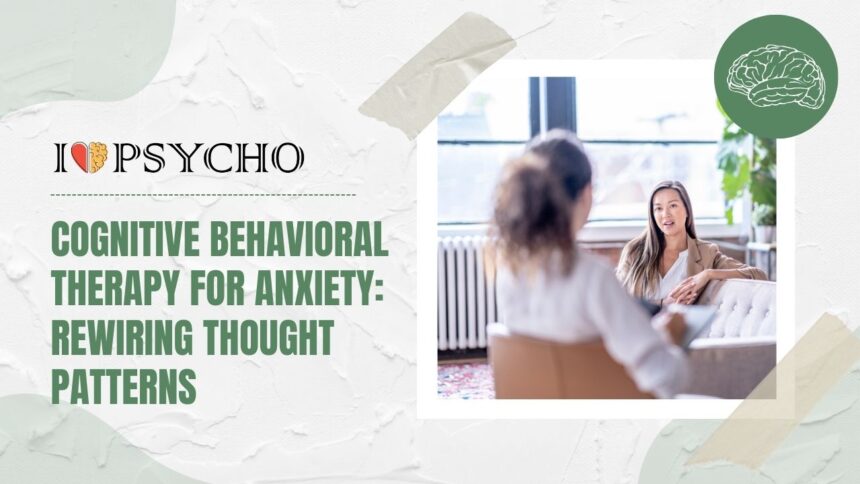Feeling like your mind is running a marathon while your body stands still? You’re not alone. Anxiety can be overwhelming, but there’s hope. Cognitive Behavioral Therapy (CBT) offers a roadmap to rewire those anxious thought patterns and reclaim control of your life. Join us on a journey to explore how CBT can be a game-changer in the battle against anxiety.
Understanding Anxiety and its Cognitive Roots
Anxiety is like a broken record playing worst-case scenarios on repeat in your mind. It’s that nagging feeling of unease, the racing heart, and the sweaty palms when faced with everyday situations. But where does this anxiety come from? It’s not just random; there are cognitive roots deeply embedded in our thought patterns.
Our brains have a way of magnifying threats and underestimating our ability to cope with them, leading to a constant state of worry and fear. Negative beliefs about ourselves or the world around us can fuel this cycle of anxiety, keeping us trapped in a loop of distress.
Understanding these cognitive roots is key to unraveling the complexity of anxiety disorders. By delving into how our thoughts influence our emotions and behaviors, we can start peeling back the layers of anxiety to reveal its core triggers.
The Basics of Cognitive Behavioral Therapy (CBT)
Cognitive Behavioral Therapy (CBT) is a widely recognized form of psychotherapy that focuses on the connection between our thoughts, feelings, and behaviors.
In CBT, the therapist works collaboratively with the individual to identify and challenge negative thought patterns and beliefs that contribute to anxiety. By changing these cognitive distortions, individuals can learn new ways of thinking and reacting to situations.
One key aspect of CBT is its goal-oriented nature – setting specific targets for therapy helps track progress effectively. This structured approach allows individuals to develop practical strategies for managing their anxiety in real-time.
Through various techniques like cognitive restructuring and behavioral experiments, CBT empowers individuals to take an active role in reshaping their mental processes. It’s not just about talking; it’s about learning actionable skills to tackle anxiety head-on.
How CBT Addresses Anxiety
When it comes to addressing anxiety, Cognitive Behavioral Therapy (CBT) shines as a powerful tool. Instead of just focusing on surface-level symptoms, CBT delves deep into the underlying thought patterns that fuel anxiety. By identifying and challenging negative beliefs and distorted thinking, CBT helps individuals reframe their perceptions and reactions.
Through structured sessions with a therapist, CBT provides practical strategies to manage anxious thoughts in real-time. It equips you with skills to recognize triggers and develop healthier coping mechanisms. By breaking down overwhelming situations into manageable steps, CBT empowers you to take control over your anxiety rather than letting it control you.
With its evidence-based approach, CBT offers a systematic way to tackle anxiety head-on. It instills long-lasting changes by rewiring neural pathways associated with fear and worry. By fostering self-awareness and promoting positive behaviors, CBT guides individuals towards a path of resilience and emotional well-being.
Techniques Used in CBT for Anxiety Treatment
In Cognitive Behavioral Therapy (CBT) for anxiety treatment, therapists utilize various techniques to help individuals reframe their thought patterns and behaviors. One common technique is cognitive restructuring, where clients learn to identify negative thoughts and replace them with more balanced and realistic ones. This process helps break the cycle of anxious thinking.
Another effective technique in CBT is exposure therapy, where individuals gradually confront feared situations or objects in a safe environment. By facing their fears head-on, clients learn that they can tolerate discomfort and reduce their anxiety over time. This approach helps desensitize them to triggers that once caused intense fear.
Mindfulness techniques are also frequently used in CBT for anxiety. Clients practice being present in the moment without judgment, which can help reduce feelings of worry about the future or rumination on past events. Mindfulness encourages acceptance of one’s thoughts and emotions without getting caught up in them.
Additionally, behavioral activation is often incorporated into CBT for anxiety to encourage clients to engage in activities that bring pleasure or a sense of accomplishment. By focusing on positive experiences and increasing meaningful interactions, individuals can improve their mood and overall well-being during the course of treatment.
Benefits and Success Rates of CBT for Anxiety
Have you ever wondered about the benefits of Cognitive Behavioral Therapy (CBT) for anxiety? Well, let’s dive into it.
One of the key advantages of CBT is its effectiveness in helping individuals identify and challenge negative thought patterns that contribute to their anxiety. By restructuring these cognitive distortions, CBT empowers people to develop healthier ways of thinking and coping with stressors.
Moreover, research has shown that CBT can lead to significant improvements in symptoms for many individuals struggling with anxiety disorders. The structured nature of CBT sessions allows therapists to tailor treatment plans to each person’s specific needs, increasing the likelihood of success.
Additionally, unlike medication-based treatments that may have side effects or dependencies, CBT offers a more sustainable solution by equipping individuals with lifelong skills to manage their anxiety effectively.
In essence, the benefits and success rates of CBT for anxiety highlight its role as a valuable tool in promoting mental well-being and providing long-term relief from debilitating symptoms.
Alternative Therapies for Anxiety
Exploring alternative therapies for anxiety can open up new avenues of healing beyond traditional methods. Practices such as mindfulness meditation, acupuncture, yoga, and aromatherapy have gained popularity for their ability to reduce stress and promote relaxation.
Mindfulness meditation involves focusing on the present moment without judgment, which can help calm racing thoughts and alleviate anxiety symptoms. Acupuncture targets specific points in the body to rebalance energy flow and ease tension. Yoga combines physical postures with breathwork to enhance mind-body awareness and decrease anxiety levels.
Aromatherapy utilizes essential oils like lavender or chamomile to create a soothing atmosphere that promotes relaxation. These alternative therapies offer individuals diverse options for managing their anxiety alongside conventional treatments.
While not everyone may find success with these methods alone, incorporating them into a holistic approach to mental health can provide additional support in coping with anxiety challenges.
Developing Coping Strategies and Skills
Developing coping strategies and skills is a vital aspect of managing anxiety effectively. By learning how to identify triggers and recognize negative thought patterns, individuals can begin to take control of their emotional responses. One effective technique is practicing mindfulness, which involves staying present in the moment without judgment. This can help reduce feelings of overwhelm and promote a sense of calm.
Another helpful strategy is implementing relaxation techniques such as deep breathing exercises or progressive muscle relaxation to alleviate physical symptoms of anxiety. Additionally, challenging irrational beliefs through cognitive restructuring can reframe unhelpful thinking patterns into more realistic and positive ones.
Engaging in regular physical activity, maintaining a healthy diet, getting enough sleep, and seeking social support are all important factors in developing resilience against anxiety. It’s essential to remember that building coping skills takes time and practice but can lead to long-lasting benefits for mental well-being.
Case Studies: Real-Life Success Stories of CBT for Anxiety
Let’s dive into real-life success stories of Cognitive Behavioral Therapy (CBT) for anxiety. Meet Sarah, who struggled with constant worry and panic attacks. Through CBT, she learned to challenge her negative thought patterns and develop healthier coping mechanisms.
Then there’s John, who battled social anxiety for years. With the help of CBT techniques like exposure therapy and cognitive restructuring, he gained confidence in social situations and overcame his fears step by step.
And let’s not forget Emily, who suffered from generalized anxiety disorder. By working with a CBT therapist, she identified triggers that fueled her anxiety and learned how to manage them effectively through relaxation techniques and mindfulness practices.
These are just a few examples of how CBT has transformed the lives of individuals struggling with anxiety disorders. The power of rewiring thought patterns through targeted interventions cannot be underestimated.
Incorporating CBT into Your Life: Tips and Resources
Incorporating Cognitive Behavioral Therapy (CBT) techniques into your daily life can be a transformative experience. One tip is to start by being mindful of your thoughts and identifying any negative or anxious patterns that may arise. By bringing awareness to these thought processes, you can begin the process of rewiring them.
Another helpful strategy is to practice relaxation techniques such as deep breathing exercises or progressive muscle relaxation. These tools can help calm your mind and body during moments of heightened anxiety. Additionally, setting small, achievable goals for yourself each day can build confidence and momentum in overcoming anxious thoughts.
Seeking out resources such as self-help books, online CBT programs, or support groups can also provide valuable guidance and encouragement on your journey towards managing anxiety with CBT techniques. Remember, incorporating CBT into your life is a personal process that requires patience and commitment but the rewards are invaluable in improving mental well-being.
Conclusion
As you navigate the challenging waters of anxiety, remember that Cognitive Behavioral Therapy offers a beacon of hope. With its evidence-based approach and practical techniques, CBT has shown great promise in helping individuals rewire their thought patterns and reclaim control over their lives. By understanding the cognitive roots of anxiety and learning to challenge negative beliefs, you can pave the way for lasting change.
Whether you choose to explore alternative therapies or focus on developing coping strategies, know that there is support available. Real-life success stories serve as a reminder that healing is possible, and with dedication and guidance, you too can find relief from anxiety.
Incorporating CBT into your life may not always be easy, but it is a journey worth embarking on. Remember to be patient with yourself, practice self-care regularly, and seek professional help when needed. By taking small steps consistently towards positive change, you can rewrite your story and embrace a future free from the grips of anxiety.
Embrace the power of CBT for anxiety – let it be your guiding light towards a brighter tomorrow filled with peace and resilience.









